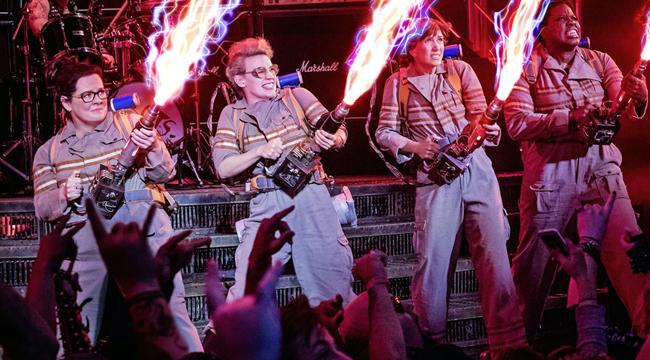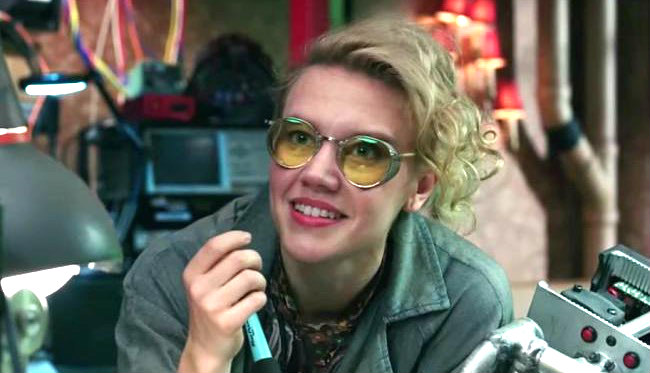
I want to feel unrestrained glee over the idea of a new Ghostbusters film from Jason Reitman (son of Ivan, the director of the original two). It’s quite likely the pop culture staple that I most give a damn about. Peter Venkman was the rock upon which I built my (mostly retired) sarcastic slacker persona in my early ’20s and Ghostbuster action figures have been a continuing obsession since childhood. This news should have me levitating off my bed and doing spin moves beside a fountain, but the complete abandonment of Ghostbusters: Answer The Call has me initially feeling a little hollow (while complimentary towards it, Reitman has said that he isn’t going to draw from Paul Feig’s female-team focused film).
Ghostbusters: Answer The Call is not my favorite Ghostbusters movie but it has some fun moments. More importantly, it also has a collection of amazing performances from Kate McKinnon, Leslie Jones, Chris Hemsworth, Melissa McCarthy, and Kristen Wiig that were obscured by the noise (and coverage) of the 2016 Ghostbusters Culture Wars where a vocal segment of (mostly male) Ghostbusters fans revolted in response to the idea of the film. Answer The Call also means a lot to a lot of people, which is a cool thing. I know that sounds like virtue signaling, and I guess it is, but I really feel like pop culture moves forward at a higher velocity than I do and that it makes more sense to share my toys than break them so that no one else can enjoy them.
I wanted to see more from the Ghostbusters: Answer The Call cast and their characters since so much time was spent introducing them and running them through scenarios that, at times, felt too similar to the original Ghostbusters film. In a lot of ways, Answer The Call commits the same nostalgia drunk sins as Star Wars: The Force Awakens did, feeling like a cover song in places. And that has some appeal, but we’re never going to get the satisfying The Last Jedi “kill the past” chaser for Paul Feig’s Ghostbusters. And that’s not solely because of that culture war or the film’s middling box office returns.

The obvious difference between the Star Wars and Ghostbusters‘ franchise restarts is that the former is heavily woven into the mythology and the latter does it only in a surface, wink-wink way. The reasoning behind Feig and screenwriter Katie Dippold’s decision to sever the tie to the original characters and universe and start from scratch boils down to concerns about putting the story within a world where ghosts were more fact than frightening revelation and also a want to see the Ghostbuster’s technology get developed.
There were also concerns about dealing with the absence of the originals and, specifically, the death of Harold Ramis. And that’s… not totally unreasonable? I was flummoxed by the decision at first and it never really sat 100% right with me, but I’m thinking about it now and I can understand how “a team of women run toward shocking and unbelievable danger with tools of their own creation” better connects with the film’s concept than “a team of women learn the ways of the Ghostbusters and uphold their legacy.” Still, there’s a certain “have their cake and eat it too” vibe with that desire and the inclusion of those fan service elements (though, it sounds like there were also some competing ideologies during production).
Hindsight allows me to feel that the filmmakers could have made something that felt like their own thing without going all or nothing and making it so difficult to connect these characters and the original characters at a later date. (Because expecting the next creative team to add the oxygen-sucking device of travel between parallel worlds isn’t exactly building half a bridge.) History pushes me to think that everyone should have realized that these characters might be able to outlive a less than inspiring box office or critical result. After all, the last 30 years of Ghostbuster brand staying power has been predicated on that same belief with Venkman, Stantz, Spengler, Zeddemore and the middling legacy of Ghostbusters 2.
Despite everything Ghostbusters: Answer The Call was and all it could have been there is no escaping the fact that it didn’t break records or inspire sequels or spin-offs. Maybe returning to the original timeline and following the Reitman bloodline is how the brand moves toward the kind of great Marvel/Star Wars multi-tentacled franchise behemoth that everyone with a stake in the thing probably wants. But the optics that align this new approach with the concerns of the “don’t ruin our childhood” brigade from 2016 are as unfortunate as they were inevitable once Feig’s film failed to clear whatever hurdle was set for it, creating the hint of controversy that Sony doubtlessly wants to avoid. There is a way forward, though.
While McKinnon, Jones, Hemsworth, McCarthy, and Wiig may be walled off from this upcoming film (and, all others, most likely) some of the ideas behind the construction of that cast are still something Jason Reitman can tap into while, at the same time, building and improving upon Feig and Dippold’s idea of what a reboot can be.
Keep the idea that anyone can be a Ghostbuster — which was born from a four-pack of schlubs in 1984 and which extended to the 2016 film — at the forefront and select a diverse and fun group of young and talented actors and actresses (preferably with existing chemistry) to be the next generation of Ghostbusters. Then show them in their suits with their proton packs. Tell us a little bit about them and make them synonymous with this new era in a hurry, resisting typical big movie strategic secrecy. Then, make your film fun and weird but don’t try to replicate the originals. Make it for this era. I repeat, make it for this era, pulling from Stranger Things and Attack The Block as much as the original. If it’s four teenagers in the country with only a loose connection to the characters from the original it can still feel like a Ghostbusters movie. Also, don’t scare easy. And maybe if all that happens then the 2016 Ghostbuster Culture War will not have been completely for naught.
